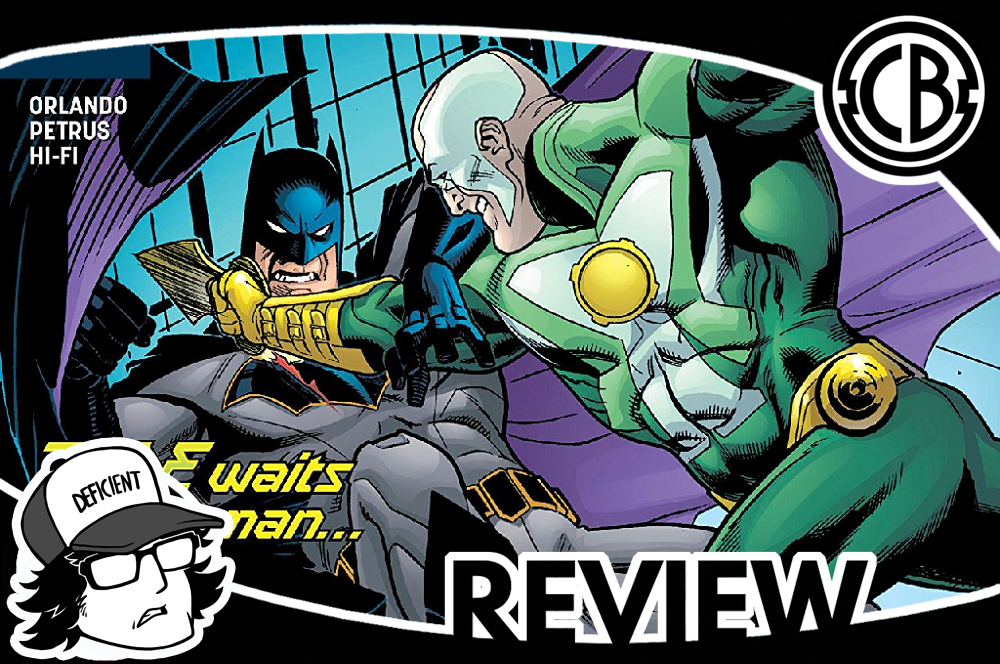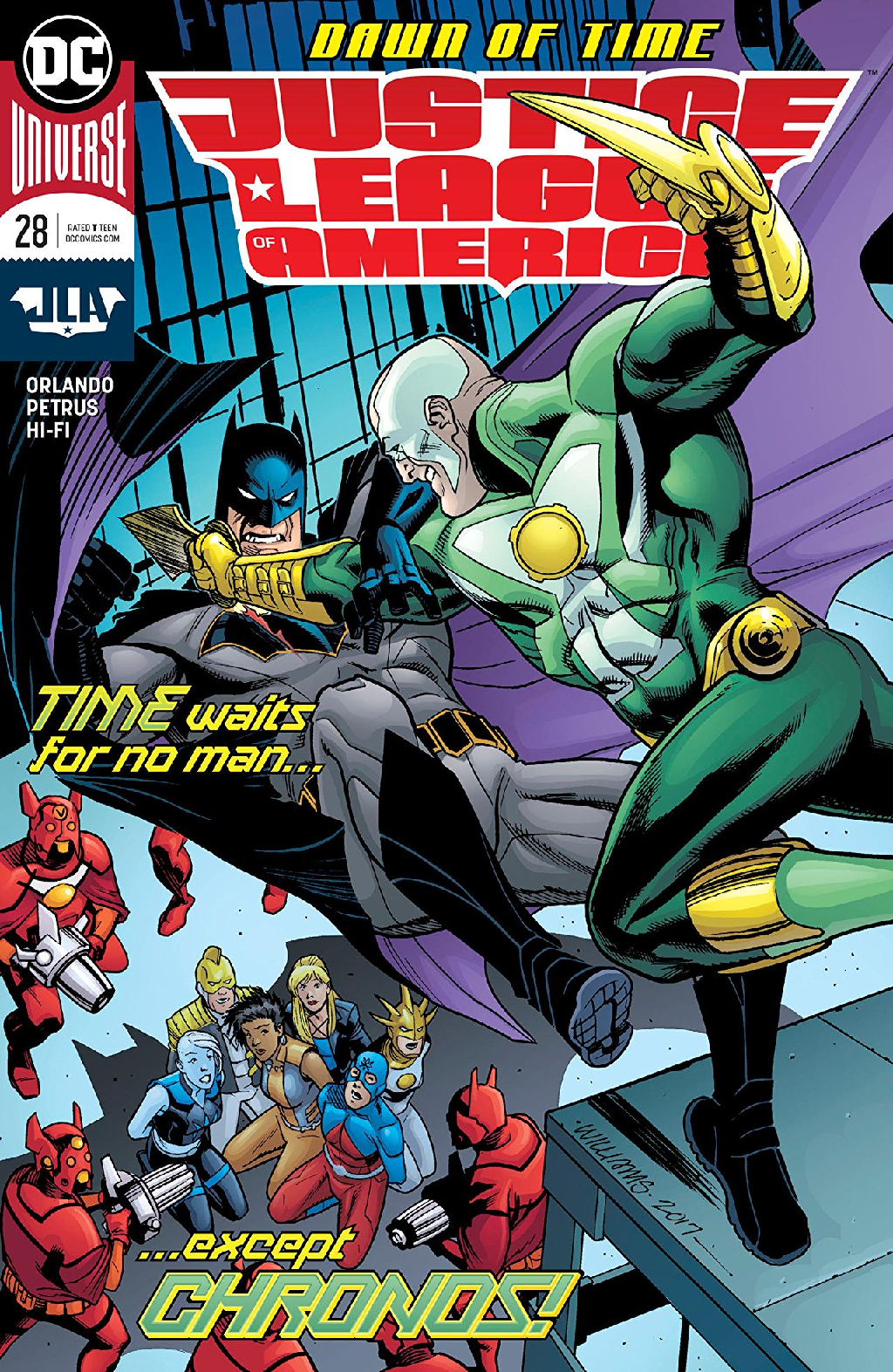Review: Justice League of America #28
By Jonathan Edwards
After reading and reviewing the absolute hot mess that was Justice League of America #27, I found a question prodding me from the back of my mind: had the introduction of Ahl, God of Superheroes, really been as out of nowhere and slipshod as I’d thought while writing that review? It seemed too poorly thought out for even Orlando, so I did some quick research and discovered that it might’ve very well tied into the recent Milk Wars crossover event between JLA and pretty much every book from DC’s Young Animal imprint. As such, I opted to verify those claims for myself. This led me not just to read the entirety of Milk Wars but also reread the first four issues of Doom Patrol, read issues #6 through #10 for the first time, reread parts of JLA #27 and #22, and, of course, read Justice League of America #28. It could perhaps be considered an excessive amount of reading, as Ahl is only relative to five of those eighteen issues. What’s more, only two of those appearances were in series other than JLA proper, and not even those make his presence here any less problematic.
As far as I know, Ahl first appeared namelessly and deceased in Gerard Way’s Doom Patrol #1, having been killed by The Disappointment with Danny when the latter was still in the form of a brick. After that, his first appearance in Justice League of America was not last issue as previously thought. Tsaritsa mentioned him back in issue #22 when explaining the relevance of Mount Justice to Caitlin, and, admittedly, editor Brian Cunningham did make a note of that last time. But, here’s the thing: there’s no reason to note that readers should “see Justice League of America #22” when Tsaritsa’s entire explanation of Ahl is already paraphrased by Ryan in issue #27. Furthermore, Cunningham fails to reference JLA/Doom Patrol Special #1, where Ahl’s origin is actually elaborated on (albeit, only slightly), and it would tell readers that he’s a holdover from Milk Wars rather than leave it up to them to figure out if they didn’t happen to read that crossover.
But, you know who wasn’t from Milk Wars? Ray Palmer’s new best friend Yun Xee. So, Steve Orlando still introduced a completely arbitrary new character as a tenuous justification for Chronos to discover the existence of Ahl. Yet, that actually makes even less sense now that I’ve read Milk Wars. How the hell does she know about Ahl in the first place? The only people who have ever mentioned him before are Danny the Ambulance, Crazy Jane (those two only in passing), Tsaritsa, and the Retconn employees during their private meeting with Lord Manga Khan, and none of those mentions were anything beyond minor exposition. In Milk Wars, Ahl only serves to give reasons for the importance of a Batman/Superman/Wonder Woman-esque trinity and Superman’s immunity to controlling properties of Retconn’s milk. And, before that, he was only in Doom Patrol to explain why Danny the Street became Danny the Ambulance, why Crazy Jane gained a new personality that started a cult, and to tease The Disappointment. His existence was never focused on or actively discussed. It’s almost as if Gerard Way never intended for the DC Universe at large to know about him and only created the God of Superheroes to give his backstories a bit more personality. And then, Steve Orlando went and missed the point. So, we get a random psychic alien that doesn’t have anything to do with anything that knows about him for no good reason, especially when the ending of Milk Wars could have very well erased Ahl from canon existence.
Moving forward, Justice League of America #28 is another bad issue, and that’s in no way surprising. For one, Chronos’s motivations make no sense. He wanted to kill Ahl to prevent the existence of Ray Palmer’s Atom, so why does he bother chaining Ahl up? To make the JLA forfeit their dignity? Why does he suddenly care about that? Why does he keep dismissing Ryan as “the knockoff” yet also continue to insist on interacting with Ryan above any other member of the JLA? Why does Ahl know English? Why does Ahl know Ray’s name without being introduced to him? How can Ahl share Ray’s burden of maintaining the hard-light hologram fortress? If he can’t, why does he offer? As per usual, these questions are all rhetorical, and even if they weren’t, there still wouldn’t be any good answers.
Now, I will give a spoiler warning for this next bit, because I really need to talk about the ending of this issue in detail. So yeah, spoilers ahead.
After Chronos’s forces finally break down Ray’s fortress by way of the supervillain Chemo, Chronos defeats both Ryan and Ray in one on one combat. From there, he approaches Ahl, declaring that the God of Superheroes “once joked only one thing could kill [him].” Chronos then produces Danny the Brick and kills Ahl, mirroring his death shown, once again, in Doom Patrol #1. And, this is really fucking stupid. Just because Danny was used to kill Ahl in that book doesn’t mean it was the only way Ahl could die. Additionally, how would Ahl have even learned that Danny the Brick could kill him? Danny was previously a sentient street before becoming a brick, but Ahl reacts as if Danny the Brick has always been a thing. It feels like Orlando is just doing what Gerard Way did because he thinks it’ll make him as clever as Way but doesn’t understand that it makes no sense in this context. Also, this all but guarantees that another hero will be responsible for the “imprint” supposedly left by Ahl. Speaking of the imprint, that’s another thing that makes less sense after reading Milk Wars. The imprint was never mentioned before JLA #27. Rather, JLA #22 simply stated that “the myth of justice” was born after the God of Superheroes first arrived at Mount Justice, and the JLA/Doom Patrol Special #1 claims that the idea of justice spread from Ahl when he arrived and was “embodied there by three timeless ideas.” Both statements are far more consistent with his influence being metaphorical, or at least metaphysical, over anything else. So, where did the imprint come from? Well, presuming I’m right about another hero making the imprint instead of Ahl, then I’d wager it’s the result of Orlando wanting to copy Gerard Way but realizing it’d fuck up DC continuity. Thus, he came up with a shallow loophole so he could have his cake and eat it too.
Okay, the ending spoilers are over.
Pretty much everything I said about Hugo Petrus’s art last time remains applicable. I don’t know; he just doesn’t do it for me. Everything is too lifeless and plastic for me to get emotionally involved in anything that’s going on. Maybe it wouldn’t be as big of a deal if the story was worthwhile, but it isn’t.
There’s only one issue left of Steve Orlando’s Justice League of America and thank merciful God. Frankly, it’s astonishing this book made it this far. Between all of the preachy superficial morals, half-baked story arcs, underdeveloped characters, misrepresented characters, illogic, mean-spiritedness, condescension, and blatant lack of genre-savviness, this has been an utterly miserable and mediocre trod. I’m not especially looking forward to Justice League: No Justice, and it’s a damn shame that Priest’s Justice League run is also ending to facilitate it. But, there’s no way that Snyder, Tynion, and Williamson can do any worse with that series then Orlando’s done with this one.
Score: 1/5
Justice League of America #28
DC Comics


